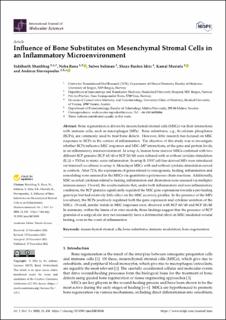| dc.description.abstract | Bone regeneration is driven by mesenchymal stromal cells (MSCs) via their interactions with immune cells, such as macrophages (MPs). Bone substitutes, e.g., bi-calcium phosphates (BCPs), are commonly used to treat bone defects. However, little research has focused on MSC responses to BCPs in the context of inflammation. The objective of this study was to investigate whether BCPs influence MSC responses and MSC–MP interactions, at the gene and protein levels, in an inflammatory microenvironment. In setup A, human bone marrow MSCs combined with two different BCP granules (BCP 60/40 or BCP 20/80) were cultured with or without cytokine stimulation (IL1β + TNFα) to mimic acute inflammation. In setup B, U937 cell-line-derived MPs were introduced via transwell cocultures to setup A. Monolayer MSCs with and without cytokine stimulation served as controls. After 72 h, the expressions of genes related to osteogenesis, healing, inflammation and remodeling were assessed in the MSCs via quantitative polymerase chain reactions. Additionally, MSC-secreted cytokines related to healing, inflammation and chemotaxis were assessed via multiplex immunoassays. Overall, the results indicate that, under both inflammatory and non-inflammatory conditions, the BCP granules significantly regulated the MSC gene expressions towards a pro-healing genotype but had relatively little effect on the MSC secretory profiles. In the presence of the MPs (coculture), the BCPs positively regulated both the gene expression and cytokine secretion of the MSCs. Overall, similar trends in MSC responses were observed with BCP 60/40 and BCP 20/80. In summary, within the limits of in vitro models, these findings suggest that the presence of BCP granules at a surgical site may not necessarily have a detrimental effect on MSC-mediated wound healing, even in the event of inflammation. | en_US |

